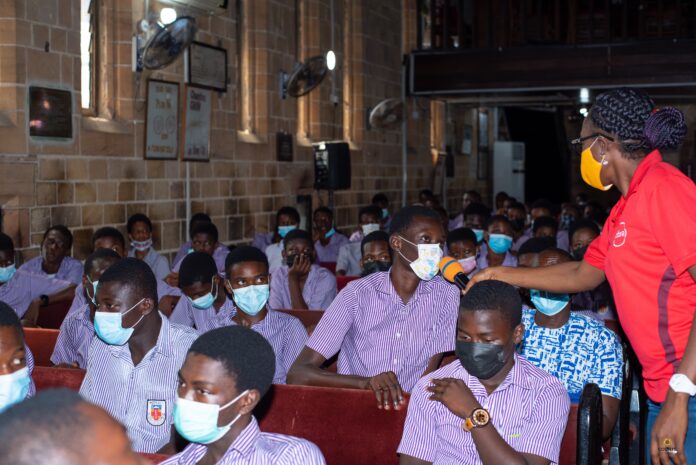
The image of the ancient relic – built-in 1894 – delightfully having its day in the sun in an environment of modernity, is unforgettable. This is the Cathedral Church of the Most Holy Trinity situated in the heart of Ghana’s High Street in Accra.
Opposite this ancient wonder is the City Car Park, a reserved parking arena known to house the automobiles of most corporate organizations littered across the business center. Adjacent to this is Absa Bank – a leading financial service organisation with a heritage as old as the Holy Trinity Church itself.
If it is true what they say about this cathedral building, then we should be according it more honour than it is currently receiving. It was apparently designed by the legendary Aston Webb – same British Architect who designed the Buckingham Palace and the University of Birmingham in the UK.
This fine Friday morning – November 19, 2021 – a section of employees from the Legal and Compliance department at Absa Bank, have gathered on the compound of the Anglican Church. They are in conversation with teachers at a secondary school (Holy Trinity Cathedral Senior High School) that shares the same compound with the church. The Absa Bank team is about to interact with the students on a skills training programme instituted by the bank. This is part of a long-term plan by Absa Bank to create impact in the communities where it operates.
Multinational organizations like Absa Bank, operate with a focus on high financial performance and a commitment to impacting the communities where it operates. It places great emphasis on initiatives such as youth skills training and development to empower emerging leaders. These are soft skills that complement its core commercial mandate and endears the brand to stakeholders and the society.
“We are making progress with the quality and output of our students. It hasn’t been an easy road. Science and Mathematics are still areas we need to tighten,” the Assistant Headmaster of the school tells Edem Ama Sekyi, Absa Bank’s Company Secretary just before the main session begins.
Other bank employees join in. Soon the conversation gravitates towards the ongoing National Science and Maths Quiz, which is sponsored by Absa Bank.
“Oh, we did well [in the competition] last year. We are proud of the progress we made. Clearly, we have to do more,” another teacher, who had joined the small gathering, chips in. The conversation is immediately truncated because the team is alerted that the students are ready.
Into the church auditorium they strode. Here eager students are gathered– teenagers from different class levels – seated with anticipatory looks strewn on their faces. When the session begins, the intensity and pace lose not a step. Led by Edem, the students are introduced to more than five members of the department, who tell interesting tales about their backgrounds and how they rose, against all odds, to become reputable professionals in the Bank.
“I was born in Nima and sold bread as a hawker,” one of the employees began as he readied himself to engage the students. Even behind the masked faces, it was obvious the expressions of shock and disbelief on their faces.
Next came Legal Officer, Sophia Haikins-Adarkwa, who outlines the rudimentary steps in becoming a legal and compliant professional. It was refreshing to see how the two parties fed off each other’s energy in the engagement session. In the end, the impact of the activity was felt during the Q&A session. The students asked a ton of questions, their inquisitive attitudes clearly on display.
A bank must stand for something where it operates and Absa Bank clearly leads the way in Ghana when it comes to that. For Managing Director, Abena Osei-Poku, Absa Bank’s unique role in society complements its long history in Ghana and highlights a winning strategy.
“We bring possibilities to life – for our clients, customers, stakeholders and the society. A big organization like ours believes in operating with a conscience. It is not enough to execute our strategy, experience growth and transformation. We believe it is a higher purpose if we can also demonstrate real impact by what we do in society. Our social responsibility brings this to life in a unique way.”
The session is now over. The teaching body and students express profuse appreciation and say their goodbyes. They will now return to their various classrooms for the day’s lessons to begin. The Legal and Compliance team make their way back to their offices. Satisfied and fulfilled.
